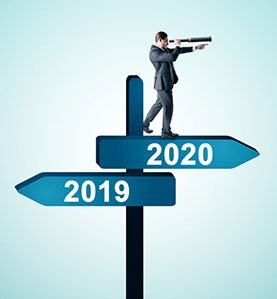Mentoring Beyond Millennials
 As we embark upon a new year, and one as iconic as 2020, it seems only right that we explore what we expect and hope to see in this coming year in terms of mentoring.
As we embark upon a new year, and one as iconic as 2020, it seems only right that we explore what we expect and hope to see in this coming year in terms of mentoring.
It feels a little weird that we are at the start of 2020, given that this date has been used as a milestone marker for the past two decades. Conduct a quick search on the internet and you could find all sorts of articles about the impending (but somehow always far-off) date of 2020. It has often been used as a marker for us to connote that we are looking into the future. What will our employees expect of us in 2020? How will people learn in 2020? What will be our main modes of communication in 2020? Will we have hovercrafts or jetpacks by 2020?
Well, 2020 is now here, so what can we say about employee development and corporate mentoring today…and where we go from here?
An Increase in Mentoring Can Be Expected
Mentoring continues to be a staple for employee development, a practice that does not go out of style—and in fact seems to be growing in popularity in recent years. A November 2019 article called “Who’s Mentoring the Future?” by Ashley St. John in Chief Learning Officer magazine highlighted the findings of their Business Intelligence Board about the state of the industry. The report showed that 62% of leaders on this board said there would be an increase in the use of mentoring over the next 12-18 months. This figure does not surprise me, especially given that employees state over and over again that they want mentoring.
2020 Mentoring Tip:
Create a mentoring program that meets people where they are in terms of their development needs and desires. Set up multiple programs under one larger mentoring umbrella that can appeal to employees at all points in their careers. River mentoring software can help you design, launch, and run a program of this type.
Mentoring Gen Z and Beyond
 As the “It” generation for most of the 2000s so far, Millennials have had their fair share of attention and news coverage. Case in point, a 2012 study from MTV called “No Collar Workers” stated that 75% of Millennials wanted to have a mentor. And in the 2016 Deloitte Millennial Survey, the report stated that 61% of Millennials did in fact have a mentor. Moreover:
As the “It” generation for most of the 2000s so far, Millennials have had their fair share of attention and news coverage. Case in point, a 2012 study from MTV called “No Collar Workers” stated that 75% of Millennials wanted to have a mentor. And in the 2016 Deloitte Millennial Survey, the report stated that 61% of Millennials did in fact have a mentor. Moreover:
“Those intending to stay with their organization for more than five years are twice as likely to have a mentor (68%) than not (32%).”
It’s clear that mentoring has been critical to Millennials as they entered and made their mark on the workforce.
Well, here we are in 2020, the oldest Millennials are turning 40, and attention is now turning to Gen Z as the youngest generation entering the workforce. (Sorry, Millennials…you had a good run.) What is clear to me is that it doesn’t matter what generation you are a part of—the newest generation into the workforce always wants mentoring. And in fact, your older employees want mentoring too! I’ve always thought of mentoring as a great equalizer. It doesn’t matter how old you are; you can benefit from participating in mentoring as a mentee and/or a mentor. This trend will continue to hold true.
2020 Mentoring Tip:
Offer mentoring to people of all ages. Encourage them to be mentees if they have something they want to learn, or ask them to participate as mentors if they have something they can share and teach others. Don’t let age be a limiting factor for who participates in mentoring.
Personal Connections through Mentoring
 As we dive into 2020, it seems we are more connected and more disconnected at the same time. Our world is becoming more digitized and it can often feel like relationships only take place behind the screen of our phones via a social media app (or only with Siri or Alexa). Yet, the truth is that people want and value true personal connections with one another. This type of genuine connection can feel like it’s missing for a lot of people and can be lacking in the workplace, but mentoring relationships can be a step that organizations take to help mitigate this loneliness and isolation.
As we dive into 2020, it seems we are more connected and more disconnected at the same time. Our world is becoming more digitized and it can often feel like relationships only take place behind the screen of our phones via a social media app (or only with Siri or Alexa). Yet, the truth is that people want and value true personal connections with one another. This type of genuine connection can feel like it’s missing for a lot of people and can be lacking in the workplace, but mentoring relationships can be a step that organizations take to help mitigate this loneliness and isolation.
Research from River found that 90% of people said mentoring helped them develop a positive relationship with someone else at their company. This is a powerful result. Mentoring makes people feel connected. Making those connections and having that access to one another is a factor that will continue to grow in importance for younger generations, according to generational expert Ryan Jenkins.
2020 Mentoring Tip:
Help people build relationships and create a sense of community by giving them a way to engage in mentoring. Your mentoring program can be a way to help people feel less alone at work. Even if that is not the core reason for having a mentoring program, that is a pretty amazing side benefit.
As we ring in 2020, I hope that all of us can find ways to bring more mentoring into our lives. I predict we will all be better because of it.








